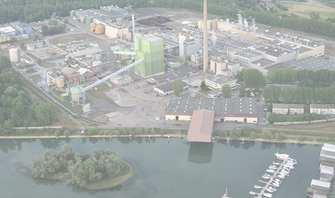 Short transport distances, recycled fibres, and biomass energy give Maxau Mill, the second largest producer of SC papers in Europe, a leg up.
Short transport distances, recycled fibres, and biomass energy give Maxau Mill, the second largest producer of SC papers in Europe, a leg up.
The Maxau Mill lies in an ideal location – just to the north of the Black Forest, in a German town near the Rhine River and the border to France. Its close proximity to both the French and German markets offers the mill, the second largest producer of super-calendared (SC) papers in Europe, an unparalleled advantage. With the forest as well as urban woods nearby, Maxau Mill is close to both the sources of fibre and to many who rely on its services.
“Maxau Mill is a geographically well-placed mill with a flexible fibre source and a wide range of SC products so we can serve the market really well. And with a sustainable energy solution, we can find a good balance between quality and sustainability for our customers,” says Tomas Larsson, VP Segment News and Book Papers at Stora Enso Papers.
Those shorter delivery distances allow the mill to provide one intangible benefit that other mills cannot offer: time. Reduced times in transit results in a quicker turnaround that extends to the call off for printing – lengthening the amount of time publishers have to sell advertisements and perhaps the number of pages printed in the flyer or leaflet.
“Many magazine or flyer publishers make their money through advertising. Because we are so close to the markets, we can offer customers a shorter gap between the time we go to print and the time it’s delivered,” says Larsson. That shortened gap makes it easy to create a quality product more quickly.
Mixing fibres to find a product fit for purpose
By using both recycled and virgin fibres and with the capacity to create papers derived from a mixture of the two, the Maxau Mill can work with customers to find the right paper to fulfil the requirements of their jobs. Whether that be through reduced grammage for products that are high frequency with a short lifespan, such as supermarket flyers, or which require enhanced brightness to create an exclusive magazine product, Maxau Mill can find the right paper.
“You can alter the assemblage of the fibres to create a designer product fit for purpose,” says Larsson. “So if you require 100% recycled fibres for environmental purposes, you can use that. Or you can create a more exclusive-looking or premium product by mixing the fibres. Our papers are uncoated but by adding gloss via calendaring, we can offer an alternative to coated magazine papers.”
With such a variance, the SC papers can be adjusted to best suit customer needs – and respond to the modern demand for papers that are both quality and environmentally-friendly.
Higher standards for sustainability
Lower weights, responsibly sourced fibres, and shorter transit times aren’t the only environmental benefits that production at Maxau Mill provides. Larsson notes that with a high share of their own energy production, Stora Enso is in a good position to withstand fluctuations in the energy market. A new steam turbine that went online in 2020 as well as the ability to use biomass for energy has simultaneously increased heat and energy production while reducing carbon emissions in the city of Karlsruhe.
With the capacity to print everything from supermarket flyers to catalogs and stand-alone magazines and skilled professionals able to find just the right mix of fibres for your SC paper printing, Maxau Mill offers something only few other mills can provide.

















































































